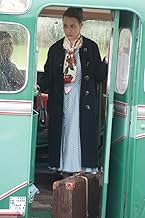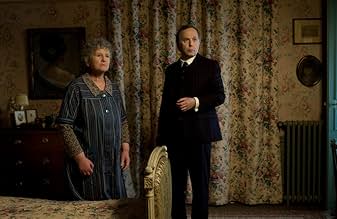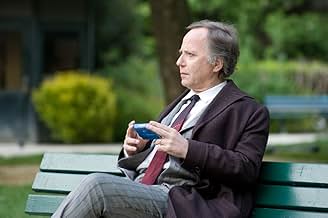Les femmes du 6e étage
- 2010
- Tous publics
- 1h 44m
IMDb RATING
7.1/10
11K
YOUR RATING
In 1960s Paris, a conservative couple's lives are turned upside down by a group of Spanish maids that live in the same building.In 1960s Paris, a conservative couple's lives are turned upside down by a group of Spanish maids that live in the same building.In 1960s Paris, a conservative couple's lives are turned upside down by a group of Spanish maids that live in the same building.
- Director
- Writers
- Stars
- Awards
- 2 wins & 3 nominations total
- Director
- Writers
- All cast & crew
- Production, box office & more at IMDbPro
Featured reviews
This is a pure delight. The director, Philippe Le Guay, has the perfect touch, never too light, never too heavy. And he is supported in this delicate balancing act by a marvellous cast, whose timing, tone and style are all perfectly attuned. The central performance in the film is given by the French comic actor Fabrice Luchini, an intelligent simpleton, a naïve bourgeois who has unexpectedly been let loose on Life. Luchini is a true marvel, a world class talent at understated comedy. He has at times the innocent puzzlement of silent comedian Harry Langdon come over his face, a kind of infantile bewilderment, but he is equally capable of snarling arrogantly as a domineering bourgeois buffoon and demanding that his boiled egg must boil for precisely three and a half minutes. He even admits that if he gets the correctly prepared egg in the morning, the rest of his day is glorious, but if he gets an egg which is too hard, his day is ruined. The task set to his maid is therefore going to determine his every day's mood! Luchini owns a large house in Paris (apparently, from what I could glimpse of a park scene, intended to be within walking distance of the quiet and sleepy Parc Monceau). He has inherited it and a prosperous brokerage and investment management business from his father. The film is set in 1962. Every day he goes to work to advise rich people how to invest their money. One of his clients is a glamorous rich widow, played unexpectedly in a cameo performance by the dazzler Audrey Fleurot from the police series ENGRENAGES (SPIRAL, 2005 onwards). Some wonderful laughs come from this association. Fleurot is reputed to be a man-eater, and Luchini's wife is worried that she will steal him from her, but little does she realize that he has barely noticed Fleurot (if you can imagine anyone not noticing Fleurot, which I cannot). This is a mere side event to the main tale. Much of Luchini's huge 19th century house is rented out to other families, and the maids of all of these haute-bourgeois people including his own live together in squalor in small servants' rooms on the sixth floor, hence the title of the film. Only one maid is of the traditional sort, an elderly Bretonne maid from Britanny, and she departs near the beginning of the film. All the rest are gabbling and gregarious Spanish women, who evidently in the 1960s were flocking to Paris to earn money to send home. They form their own tightly-knit sub-culture, invisible to their employers. Anyone who has been to Hong Kong will be familiar with the myriads of Philippino maids who are strewn all over Central every Sunday chattering away to each other in Tagalog. It is very much the same phenomenon. Luchini is married to the ultimate bourgeoise wife, formerly 'a country girl', who is now ruthlessly climbing the social ladder and, wallowing in spoilt self-pity, 'exhausts' herself every day having lunch with her friends and buying expensive dresses. She is played to perfection by Sandrine Kiberlain, veteran of 48 films, who is so often cast as a wife. Admirers of the classic L'APPARTEMENT (THE APARTMENT, 1996, see my review) will recall her waiting at the airport for her husband at the end of the film, with her wan smile and her freckles. But the main action of this film concerns the Spanish maids. While their spoilt rich employers below live lives of stultifying boredom and pointlessness, these impoverished maids, when they are not rushing off to mass and crossing themselves devoutly (all but the sullen one who has become an atheist because her parents were murdered in front of her by Franco's men), have tremendous fun, play the guitar, cook paella, dance a bit of flamenco, and live a vivacious life of their own in their rarified micro-climate on the sixth floor. When his Bretonne maid, who had served the family for thirty years, leaves, Luchini and his wife desperately need a replacement. The dishes are piled high in the sink, the lazy Kiberlain does not know how to work a washing-machine, and Luchini is desperate because he does not have a clean shirt left to wear to work. What can these poor suffering spoilt rich people do? A miracle occurs: one of the Spanish women has just had her niece turn up from Spain, a beautiful thirty-something played with inspired vivacity and satirical demeanour by Natalia Verbeke. She is an amazing actress, born in Argentina in 1975, moved to Spain was she was eleven, lived with a bullfighter, and has appeared in many Spanish TV series and films. When she becomes the new maid, a new life opens up for Luchini, and he realizes that he prefers the maids on the sixth floor for company to his own boring wife and his empty life. And he begins to fall for Natalia, which is hardly surprising, as she is so alluring. The film is at once a tasteful satire on the vacuities of the empty lives of the upper middle classes, a hilarious comedy, a sad commentary, a poignant insight into the silent suffering of people without any money, and the shattering clash of cultures which occurs when someone steps out of the one world and into the other. The film is such a joy, and its satire is so affectionate and gentle (which perhaps makes it all the more devastating), that we learn a lot about Life. And Life is in short supply these days. But prepare to laugh yourself silly, while crying sometimes. Those are the best films, aren't they?
A great movie, with wonderful actress and actor, soft, funny, intelligent and deeper as it seems apparently. If you pay attention the flick will let you think upon many things and, in any case, you will leave the theater in a good and serene mood not only in your mind, but also in your heart. Very refreshing!!! Luchini is excellent (as always) in his wonderful character. He recognize the opportunity to change his life and he seize it on. Today maybe it is hard to imagine that a rich man can show that kind of interest for people of a such different social condition. But in the Sixties sometimes that could happen, the social dehumanization was not so advanced like today, in spite of all the contradictions of those years, which are very well represented. Very good also Kiberlain as his wife. She is perfect in her attitude as snooty new rich. The whole cast of the movie and especially the Spanish women are simply great: they show how a change was urgently requested, at that time... and let us understand, today also!
The nice thing about "The Women on the 6th Floor" is that it stops itself just short of being an important film with a big statement. I can't help but think of it as a lighter cousin to "The Help"; while "The Help" shoved its self-righteous social consciousness right into the viewer's face, this French comedy chooses to remain a silly romantic comedy and keep the social commentary as subtext. The wealthy protagonist isn't out to change world orders, and he really isn't all that progressive (like Emma Stone's character in The Help), he just wants to get into the Spanish maid's pants. That means the movie got a lot less attention (and would have even if we eliminated the element of Americans' strange refusal to read subtitles) but it's a lot more entertaining, a lot less irritating, and not any more shallow as far as social commentary goes.
It isn't quite a great film. It's very naive, very unrealistic, and French cinema buffs may point out that it's a throwback to films made over half a century ago. The Spanish characters are extremely stereotypical, and the romance makes less and less sense as the film goes on, most jarringly in the incredibly silly, entirely unconvincing, saccharine ending, which almost ruined the whole thing for me. Nevertheless, it's funny and enjoyable throughout, Fabrice Luchini is superb in the lead, and all the supporting characters (even the stereotypical maids) are wonderfully crafted. And interestingly, it's the ignoble motivation of the protagonist that makes him much more compelling than Emma Stone in "The Help"; as unrealistic as the story is, the character is quite real, and makes for a delightful comedic protagonist, which in turns leads to a delightful little movie.
It isn't quite a great film. It's very naive, very unrealistic, and French cinema buffs may point out that it's a throwback to films made over half a century ago. The Spanish characters are extremely stereotypical, and the romance makes less and less sense as the film goes on, most jarringly in the incredibly silly, entirely unconvincing, saccharine ending, which almost ruined the whole thing for me. Nevertheless, it's funny and enjoyable throughout, Fabrice Luchini is superb in the lead, and all the supporting characters (even the stereotypical maids) are wonderfully crafted. And interestingly, it's the ignoble motivation of the protagonist that makes him much more compelling than Emma Stone in "The Help"; as unrealistic as the story is, the character is quite real, and makes for a delightful comedic protagonist, which in turns leads to a delightful little movie.
Philippe Le Guay and Fabrice Luchini, two names that go together well, are more than ever synonymous with good quality comedy. If you want to have a good time, feel free to see the three films they collaborated on: "L'année Juliette" (1995), in which Luchini makes his life awfully complicated by inventing himself a mistress ; "Le coût de la vie" (2003), where Luchini makes his life ... awfully complicated by being too tight-fisted ; and coming now "Les femmes du 6e étage" (2010), with Luchini in yet another funny role in yet another well- written comedy signed Le Guay.
This time Luchini is Jean-Louis Joubert, a Parisian stockbroker. Like Camille in "L'année Juliette" and Brett in "Le coût de la vie", the character he joyfully slips into is very imperfect and his defects and shortcomings are a sure source of laughter but, unlike in the two former films, Camille will evolve and open up to his true self, making him a more engaging hero than usual. The beginning of the movie illustrates to great effect the imperfect Jean-Louis living his regular but restricted life in his spacious luxury apartment. He is married to a stiff-necked socialite named Suzanne and has two arrogant teenage sons who, being boarders, are currently away from home. The climaxes of his life, besides making money out of thin air, are eating a perfectly cooked soft-boiled egg and being bullied by his old Breton maid. But things start changing once Suzanne hires Maria, a charming young Spanish maid. For some reason some day Jean-Louis follows Maria up the stairs to the sixth floor and discovers a "terra incognita", in other words the maid's rooms below the roofs and the strange people who inhabit them, a handful of female Spanish immigrants. Against all odds this reactionary grand bourgeois develops an instant liking for these women and for their civilization. And of course, he will fall for Maria, but not only because she is pretty, mainly because she belongs to the new world he has just discovered.
A feel good movie in a way, "Les femmes du 6e étage" is much more than just that. It is also and none the less a committed film which, although set in the 1960s, denounces evils still plaguing today's society like, for example, the appalling way immigrants are exploited by their employers and ill-thought of by a majority of the natives of their "home" country, the selfishness of tourists who will not know about the political and social situation of the countries where they spend their holidays (1962's Spain can be replaced in the 2000s by Cuba, Egypt, Tunisia and many other countries)... Conversely the film is a call for tolerance and open-mindedness, for listening to one's heart rather than one's interest. But be reassured, this dimension, although crucial, remains underlying. There are no such things as preaching or political slogans, only a fine cocktail of good acting and tender humor. And sincerity. Did you know that for that matter that Philippe Le Guay had a Spanish maid when he was a kid and that his father was a broker just like Jean-Louis? Did you know that the actresses playing the maids are all Spanish and that some of them do not even speak French? That Luchini did not know a word of Spanish before starting the film? All these facts are good points which contribute to a welcome feeling of authenticity that enhances the film.
To come back to Fabrice Luchini, he is at his best in "Les femmes du 6e étage" for two reasons: first because his character is three-dimensional and goes beyond caricature (if Jean-Louis is stiff, haughty and narrow-minded it is because he reproduces the values inculcated in him both by his parents and by his social class, not because he is rotten to the core) ; second because Fabrice shows the necessary restraint quite in keeping with the role. The result is just perfect. And the rest of the cast is on the par with him: Natalia Verbeke, fresh and adorable as Luchini's love interest ; Sandrine Kiberlain, excellent as Luchini's uptight but not so superficial wife ; and the impeccable ensemble of Spanish actresses, including Carmen Maura and Lola Dueñas (two Almodovar fixtures), Berta Ojea, Nuria Solé and Concha Galan, as the servants from Spain. Also to be acclaimed are Annie Mercier as the spiteful janitor and gloomy-faced Philippe du Janerand as Piquer, Luchini's right-hand man.
Intelligent, sensitive and funny, "Les femmes du 6e étage", the third effort of the winning duo Le Guay-Luchini", deserves its success at the box-office and will not disppoint you.
This time Luchini is Jean-Louis Joubert, a Parisian stockbroker. Like Camille in "L'année Juliette" and Brett in "Le coût de la vie", the character he joyfully slips into is very imperfect and his defects and shortcomings are a sure source of laughter but, unlike in the two former films, Camille will evolve and open up to his true self, making him a more engaging hero than usual. The beginning of the movie illustrates to great effect the imperfect Jean-Louis living his regular but restricted life in his spacious luxury apartment. He is married to a stiff-necked socialite named Suzanne and has two arrogant teenage sons who, being boarders, are currently away from home. The climaxes of his life, besides making money out of thin air, are eating a perfectly cooked soft-boiled egg and being bullied by his old Breton maid. But things start changing once Suzanne hires Maria, a charming young Spanish maid. For some reason some day Jean-Louis follows Maria up the stairs to the sixth floor and discovers a "terra incognita", in other words the maid's rooms below the roofs and the strange people who inhabit them, a handful of female Spanish immigrants. Against all odds this reactionary grand bourgeois develops an instant liking for these women and for their civilization. And of course, he will fall for Maria, but not only because she is pretty, mainly because she belongs to the new world he has just discovered.
A feel good movie in a way, "Les femmes du 6e étage" is much more than just that. It is also and none the less a committed film which, although set in the 1960s, denounces evils still plaguing today's society like, for example, the appalling way immigrants are exploited by their employers and ill-thought of by a majority of the natives of their "home" country, the selfishness of tourists who will not know about the political and social situation of the countries where they spend their holidays (1962's Spain can be replaced in the 2000s by Cuba, Egypt, Tunisia and many other countries)... Conversely the film is a call for tolerance and open-mindedness, for listening to one's heart rather than one's interest. But be reassured, this dimension, although crucial, remains underlying. There are no such things as preaching or political slogans, only a fine cocktail of good acting and tender humor. And sincerity. Did you know that for that matter that Philippe Le Guay had a Spanish maid when he was a kid and that his father was a broker just like Jean-Louis? Did you know that the actresses playing the maids are all Spanish and that some of them do not even speak French? That Luchini did not know a word of Spanish before starting the film? All these facts are good points which contribute to a welcome feeling of authenticity that enhances the film.
To come back to Fabrice Luchini, he is at his best in "Les femmes du 6e étage" for two reasons: first because his character is three-dimensional and goes beyond caricature (if Jean-Louis is stiff, haughty and narrow-minded it is because he reproduces the values inculcated in him both by his parents and by his social class, not because he is rotten to the core) ; second because Fabrice shows the necessary restraint quite in keeping with the role. The result is just perfect. And the rest of the cast is on the par with him: Natalia Verbeke, fresh and adorable as Luchini's love interest ; Sandrine Kiberlain, excellent as Luchini's uptight but not so superficial wife ; and the impeccable ensemble of Spanish actresses, including Carmen Maura and Lola Dueñas (two Almodovar fixtures), Berta Ojea, Nuria Solé and Concha Galan, as the servants from Spain. Also to be acclaimed are Annie Mercier as the spiteful janitor and gloomy-faced Philippe du Janerand as Piquer, Luchini's right-hand man.
Intelligent, sensitive and funny, "Les femmes du 6e étage", the third effort of the winning duo Le Guay-Luchini", deserves its success at the box-office and will not disppoint you.
In the 60's, in Paris, the middle-aged stockbroker Jean-Louis Joubert (Fabrice Luchini) is an uptight man that lives with his wife snobbish wife Suzanne (Sandrine Kiberlain) on the first floor of a building that belongs to him. Jean-Louis and Suzanne live a boring life and they have two arrogant sons in a boarding school.
When their maid quits the job, they hire the charming Spanish maid María Gonzalez (María Gonzalez) and Jean-Louis is introduced to a joyful Spanish community of maids on the 6th floor of his building. Jean-Louis learns about the Spanish costumes and improves the lives of the immigrants with minor support in their live condition. He also rekindles his own life with Maria and her friends. But when Maria unexpectedly returns to Spanish, Jean-Louis rethinks his life and values.
"Les Femmes du 6ème Étage" is a delightful romantic comedy based on the fight of classes and cultural differences between the French upper class and the Spanish immigrants in the early 60's in Paris. I loved this film, the cast, the direction, the characters and specially the lovely smile and look of María Gonzalez. My vote is eight.
Title (Brazil): "As Mulheres do 6o Andar" ("The Women of the 6th Floor")
When their maid quits the job, they hire the charming Spanish maid María Gonzalez (María Gonzalez) and Jean-Louis is introduced to a joyful Spanish community of maids on the 6th floor of his building. Jean-Louis learns about the Spanish costumes and improves the lives of the immigrants with minor support in their live condition. He also rekindles his own life with Maria and her friends. But when Maria unexpectedly returns to Spanish, Jean-Louis rethinks his life and values.
"Les Femmes du 6ème Étage" is a delightful romantic comedy based on the fight of classes and cultural differences between the French upper class and the Spanish immigrants in the early 60's in Paris. I loved this film, the cast, the direction, the characters and specially the lovely smile and look of María Gonzalez. My vote is eight.
Title (Brazil): "As Mulheres do 6o Andar" ("The Women of the 6th Floor")
Did you know
- TriviaPhilippe Le Guay took inspiration from his own childhood. His father was a stockbroker like Jean-Louis Joubert in the film and he himself had a Spanish maid.
- GoofsIn the street, most (if not all) men wear hats, caps or Basque berets. In France, most men stopped wearing headgear in the 1950s (in cities at least). By 1960, the vast majority of men were hatless.
- ConnectionsFeatured in Ebert Presents: At the Movies: Episode #2.13 (2011)
- SoundtracksItsi Bitsi, Petit Bikini
(Itsy Bitsy Teenie Weenie Yellow Polkadot Bikini)
Music by Lee Pockriss
English lyrics by Paul Vance
French lyrics by Lucien Morisse and André Salvet
Performed by Dalida
© Emily Music Corporation and Music Sales Corporation
Avec l'aimable autorisation de Campbell Connelly France
(P) 1960 Barclay
Avec l'autorisation de Universal Muis Vision
- How long is The Women on the 6th Floor?Powered by Alexa
Details
- Release date
- Country of origin
- Official sites
- Languages
- Also known as
- The Women on the 6th Floor
- Filming locations
- Production companies
- See more company credits at IMDbPro
Box office
- Budget
- €7,000,000 (estimated)
- Gross US & Canada
- $719,823
- Opening weekend US & Canada
- $26,200
- Oct 9, 2011
- Gross worldwide
- $27,533,970
- Runtime
- 1h 44m(104 min)
- Color
- Sound mix
- Aspect ratio
- 1.85 : 1
Contribute to this page
Suggest an edit or add missing content

![Watch Bande-annonce [OV]](https://m.media-amazon.com/images/M/MV5BNTdmOTBjM2UtOTUyMS00NDViLWI4NWEtNmVhODc1NDVjN2NlXkEyXkFqcGdeQXRyYW5zY29kZS13b3JrZmxvdw@@._V1_QL75_UX500_CR0)




























